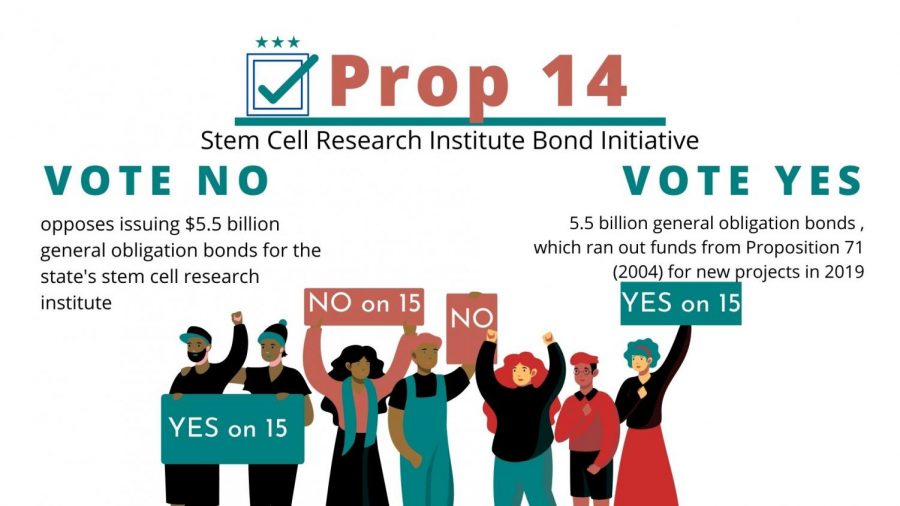Prop 14: Possible $5.5 billion to stem cell research
November 1, 2020
OVERVIEW
In addition to elected officials, voters will be able to vote for propositions on Election Day this November. One of these propositions, Prop 14, would allocate $5.5 billion to stem cell research if it passed.
In 2004, California passed Proposition 71, which issued $3 billion in bonds to fund the California Institute for Regenerative Medicine (i.e. stem cell research). This year, Prop 14, if it is passed, would continue that funding with an additional $5.5 billion. Unsurprisingly, there is a lot of debate surrounding this Proposition.
“Prop 71, which was passed by nearly 60% of California’s voters, created a landmark investment in stem cell research by creating the California Institute of Regenerative Medicine. Since then, there have been more than 90 clinical trials that have enrolled more than 4000 patients and awarded more than 1000 grants for 120 institutions, and overall there’ve been nearly 3000 peer review medical discoveries. So it’s really an incredible thing to have for our state, and allowed us to be a leader in biomedical research,” says Anna Maybach from YES on 14: Californians for Stem Cell Research, Treatments & Cures.
YES
A USC study found that the initial investment in 2004 created $640 million in new state revenue, and $10.7 million in increased economic activity as well as tens of thousands of jobs.
“Prop 14 would actually act as a much-needed stimulus and job recovery plan for California, especially in these difficult times. But also, because we are in such difficult economic times, Prop 14 has no payments for the first 6 years, and after that, it’s only about $5 per person per year paid by the state. It’s not a new tax,” says Maybach.
NO
Voting “no” on this Proposition means that the program created by Proposition 71 would come to a close without funding.
“If this Proposition does not pass, then California loses 50% of its capacity to do stem cell research which impacts the UC systems, it impacts the ability for world-class talent to be attracted to this state and to make strides in treating and curing chronic diseases and injuries,” says Maybach.
However, part of the financial burden of this Proposition does fall onto the voters.
“Overall, California’s finances are in terrible shape. State and local liabilities now amount to an incredible $1.5 trillion. To add another $7.8 billion to that would be irresponsible. Prop. 14 would spend $5.5 billion. But with interest, it would cost the taxpayers of California $7.8 billion to pay back. That’s in a year the state government’s General Fund ran a $54 billion deficit because taxes went down so much from the COVID-19 recession,” says John Seiler from No on Prop. 14.
The state of California has a chance to make back some of the money if the research leads to new inventions, but so far, it has only provided $350,000 to the state, which is less than 0.01% of the original amount.
“Meanwhile, the federal government now spends $2 billion on stem-cell research, and the private sector $10 billion. These are bonds. So the money has to be paid back somehow from the General Fund. That means two things could happen— 1:Taxes will have to go up to pay for it, or 2: Something else in the budget will have to be cut. What will be cut? Could be teachers, nurses, roads, firefighters, etc. The Legislature would decide that. Nothing is free,” says Seiler.
Overall, there are compelling arguments for both the pros and cons of Proposition 14. But one way you can make sure your opinion is heard is by going to the polls and voting on it in November.





